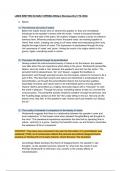LINES WRITTEN IN EARLY SPRING (William Wordsworth,(1770-1850)
● Nature
1) The harmony and unity of nature
- Before the reader knows who (or where) this speaker is, they are immediately
introduced to the speaker’s senses with the words, ‘I heard a thousand blended
notes.’ From the start of the poem, the auditory imagery creates a sense of collective
harmony here. Whoever produces those ‘thousand notes’ are working together to
‘blend’ their music, creating one song out of many notes and emphasising their unity
despite the large volume of notes. This impression is emphasised through the long
/oh/ assonance of ‘notes’ and ‘grove’, linking the music to its origins (which is the
grove). Again, everything works in unison.
2) The power of nature through its personification
- Having evoked the interconnected beauty of nature in his first stanza, the speaker
now talks about his own experience while sitting in the grove. Wordsworth personifies
Nature, who has made a ‘link’ between the speaker's soul and ‘her fair works.’ The
semantic field of pleasantness- ‘fair’ and ‘beauty’- suggest the Goddess is
benevolent, and through weaving humans into this beauty, wishes for humans to be a
part of this. This idea that humans and nature are intertwined is emphasised by the
personification, as through the personification Nature has human-like qualities-
essentially, humanity and nature seem to be interrelated parts of one big system.
- ‘Nature’ itself is personified as a mighty, benevolent figure with a "holy plan" to unite
the world in pleasure. Through her power, everything seems to take on a human-like
consciousness. The periwinkle actively "[trails] its wreaths" through the primrose, and
the "budding twigs spread out their fan" like a lady sitting in the sun. Not only do the
plants move, they feel. In this speaker's eyes, flowers don't just breathe, but "[enjoy]
the air."
3) The cruelty of humanity in comparison to the beauty of nature
- Wordsworth suggests that there is a relationship between the speaker’s outer and
inner experience: ‘In that sweet mood when pleasant thoughts/Bring sad thoughts to
the mind.’ This paradoxical experience represents the idea that by spending time in
nature, ‘reclining’ in a grove, ‘hearing’ the beautiful music, we are forced to remember
the weakness of life in comparison.
CONTEXT: ‘This poem was composed in the year the first edition of ‘Lyrical Ballads’ was
published (1798), so its sombreness reflects the personal and political disappointments
pressing on Wordsworth in his early maturity.’ (Carol Rumens, The Guardian)
- Accordingly, Blake develops this theme of disappointment- the speaker’s ‘sad
thoughts’, as the speaker becomes ‘grieved’ by ‘what man has made of man.’
Perhaps Wordsworth is referring to war, poverty or the uneasy effects of
industrialisation.
, CONTEXT: As Rumens suggests, it is true that there were various political dissapointments
during the late 18th century: deforestation of England to feed the furnaces of the Industrial
revolution; the urbanisation of green spaces; orphans and the illegitimate children of the poor
could be sold into apprenticeships that offered meagre prospects; young boys were used to
sweep chimneys; radicals led by Robespierre took over the government and started the
Reign of Terror, a violent period of time where the radicals arrested and executed anyone
who they suspected might not be loyal to the revolution.
The verb choice 'made’ implies human intent and responsibility for treatment of others.
Doesn’t shift responsibility for the corruption/oppression/damage to God or fate.
● The subjective experience
1) The power of the senses
- Before the reader knows who (or where) this speaker is, they are immediately
introduced to the speaker’s senses with the words, ‘I heard a thousand blended
notes.’ From the start of the poem, the auditory imagery creates a sense of collective
harmony here. Whoever produces those ‘thousand notes’ are working together to
‘blend’ their music, creating one song out of many notes and emphasising their unity
despite the large volume of notes. This impression is emphasised through the long
/oh/ assonance of ‘notes’ and ‘grove’, linking the music to its origins (which is the
grove). Again, everything works in unison.
- The speaker seems to share the same sensory experience as nature in the third
stanza, as it is their 'faith that every flower / Enjoys the air it breathes.’ Watching the
intertwining primroses, bowers, periwinkles and wreaths, the speaker suggests that
they can both feel that the flowers are alive, but take pleasure in life itself. but loving
life. Moreover, the speaker shares this experience, which is created by Wordsworth's
use of the fricative alliteration in ‘faith’ and ‘flower,’ which creates the soft sounds
comparable to small puffs of breath. Therefore, this suggests that the speaker, too,
breathes that same pleasurable air.
-
2) The ‘spontaneous’ overflow of thoughts and emotion
- Wordsworth suggests that there is a relationship between the speaker’s outer and
inner experience: ‘In that sweet mood when pleasant thoughts/Bring sad thoughts to
the mind.’ This paradoxical experience represents the idea that by spending time in
nature, ‘reclining’ in a grove, ‘hearing’ the beautiful music, we are forced to remember
the weakness of life in comparison.
CONTEXT: ‘This poem was composed in the year the first edition of ‘Lyrical Ballads’ was
published (1798), so its sombreness reflects the personal and political disappointments
pressing on Wordsworth in his early maturity.’ (Carol Rumens, The Guardian)
- Accordingly, Blake develops this theme of disappointment- the speaker’s ‘sad
thoughts’, as the speaker becomes ‘grieved’ by ‘what man has made of man.’
Perhaps Wordsworth is referring to war, poverty or the uneasy effects of
industrialisation.




